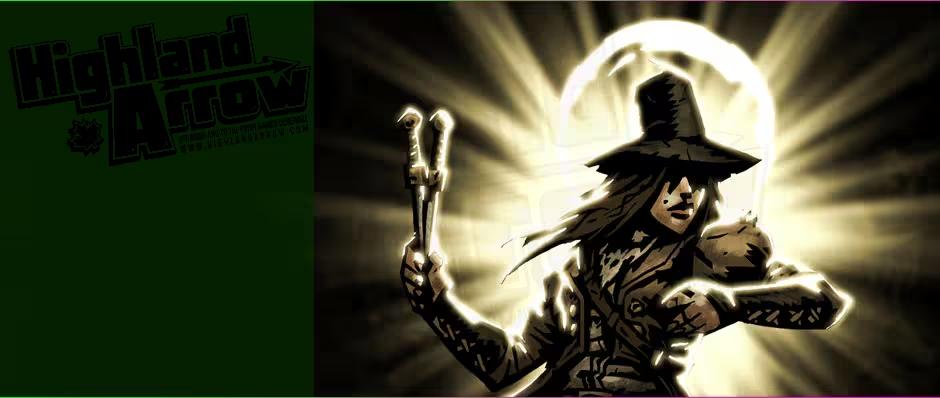


Darkest Dungeon
Platforms: PC, Linux, Mac
Reviewed on: PC
Reviewer: Maiyannah Bishop
Review Play-Time: 1443h
Developer: Red Hook Studios
Publisher: Red Hook Studios
Released: 2016-01-19
Review Published: 2020-02-02
Review Updated: 2020-04-06
+ Fantastic presentation
+ Interesting take on rogue-likes
+ Amazing soundtrack
+ Just enough depth to engage without feeling like
one needs a wiki
+ Interesting and engaging story
+ Quite technically sound
- Highly-artifical difficulty
- Several mini-bosses use fairly 'cheap' mechanics
- Often the player is punished even when performing
excellently
- A bit over-wrought in the presentation at times

Editor's Note: Please note if purchasing the Darkest Dungeon that Steam Workshop content providing a wealth of mods including alternative characters, are not available on other platforms at time of writing.
Darkest Dungeon is a rogue-like dungeon crawler developed and published by Red Hook Studios. This review has been a long time coming and one often-demanded of me due to my love for and experience with a variety of rogue-likes and rogue-lites and all those other faffy terms. Admittedly, this one got away from me at the time of release, there were just more pressing reviews to write in terms of what people wanted of me, so it ended up on the back-burner for a while. With a Darkest Dungeon 2 now looming at time of writing however, it seemed a good time to go through and look at what the original Darkest Dungeon did right, and what it did wrong. So let's take a look, shall we?
A Realm of Death and Madness
Darkest Dungeon is at its heart a party-based dungeon crawler, which evokes to my mind the likes of Dungeons & Dragons. Where D&D involves playing a role of a character as part of a multi-player party, Darkest Dungeon involves no role-playing really, and the party is entirely controlled by you, as you wander through the titular dungeons fighting evil and attempting to complete a variety of differing objectives based on the mission. Those objectives range from simply clearing or exploring enough of the rooms, which are arranged in a procedurally-generated grid format, to more complex objectives such as cleansing certain shrines which have been defiled, or recovering artefacts from the depths. What reminds me chiefly of Dungeons & Dragons is that this is assuredly a game with a focus on combat.
Where Darkest Dungeon differs from Dungeons & Dragons, other than the absence of specific roleplaying, is in the central gimmick of Darkest Dungeon: the sanity mechanic. As you progress, your characters will slowly become more and more "stressed", which is basically a sanity meter. However Darkest Dungeon does spin it in a fashion of its own: rather than simply being a failure state when that stress meter ticks over, they either assume a "Virtuous" stance such as "Focussed" or "Powerful", or a "Vice" (for lack of a better term) stance such as "Paranoid" or "Fearful." In theory this lends itself to a sort of "push your luck" mechanic where you may even intentionally try to induce that breaking point to try to get one of the buffs from them, in particularly "Powerful" is quite helpful. In reality that doesn't quite pan out, but hold that thought, because we'll return to that when we're done going over the general overview of the mechanics.
You have four hopefully-sturdy lads or lasses that will brave those adventures, and each class is fairly unique to itself if also a bit archetypical. There isn't too much here which we haven't seen elsewhere, though we do get a few variations. There is the Crusader, a holy warrior analogue for the paladin, the Bounty Hunter, a more secular fighter, the Vestal, which is essentially a holy healer, the Highwayman, essentially a rogue, the Arbelist, which fights from range such as a ranger would, the Occultist, which is your sorcerer or wizard analogue, and the Plague Doctor, a more secular healer. The one standout as something a little different is the Antiquitarian, which exists to help find relics, pickups, and most importantly gold and other currencies to bring back. They aren't very good in a fight, but they are very good at getting rewards, so the challenge exists in protecting them to successfully return the haul home. Usually, they are not worth giving up a fighter for, but in a pinch if resources are depleted, they can help bail you out. I do appreciate the thought being given to having a means to get yourself out of a resource deprivation situation, that is a common "slow death" in rogue-like games.
Death waits for the slightest lapse in concentration
The game begins by telling you to expect to make the best out of a bad situation. I feel this is a rather cynical admission by the game that it has artificial difficulty, and this only suspicion only grew to bear fruit as I played. I can readily admit that’s a bit of a judgemental first impression more based on other games than Darkest Dungeon, but it underlies a problem endemic in the design of a lot of modern rogue-likes. Allow me to expand: Most rogue-likes feature randomness as a game mechanic, and that can have both positive and negative effects on your character(s). However, most older rogue-likes were built around the manipulation of the variables surrounding these randomness to turn them into your favour. In essence, many of these older rogue-like games essentially were based around the idea of finding ways around the random element, and you learn what metaphorical and sometimes literal levers to pull and numbers to shift about to turn the game in your favour.
With its up-front declaration, Darkest Dungeon is in essence telling you "just deal with it." That's a stance somewhat contrary to these previous rogue-likes, and it leads to situations where, coupled with some largely artificial difficulty, you can be playing very skilfully but you are still losing. That is a recipe for frustration and anger in a game, and I always consider it something of a mark of poor design when I run into that. Not every game has to be fun - some of them are quite uncomfortable, such as many horror games for example, but conflict in a game is essentially an examination of how well you understand the game mechanics and in some cases how closely you have been following the game lore or story, and thusly, it is failing in that task when you are excelling in that, but still fail. Yes, sometimes life is like that, but while perhaps I am some curmudgeonly old'un with antiquated ideas, I generally play games to be entertained in at least some fashion, and basically being told how much I suck - in bellicose and verbose wordage from the narrator of the game - when I feel I've done the best I can with the tools I've have been given, that's not a good feeling, and it left me alternatively cheating/exploiting like a mofo in some instances, and just quitting and playing something else in others. Normally I try not to cheese or exploit game mechanics, as it is generally to the detriment of my enjoyment in a game when I do. I'm left thinking of a comment YouTuber TehSnakerer made in one of his videos, paraphrasing a bit here: "I will often play games in silly ways, to try to get every last bit of fun out of it." It comes to mind here. If you aren't min-maxing like your life depended on it, you are not going to beat the Darkest Dungeon on even the Radiant (easy) difficulty level. I'm left not really wanting to experiment like that, due to the fact that it feels like the game punishes me for deviating from its desired style of play.
Injury and despondence set the stage for heroism... or cowardice
There are a couple of factors which compound the frustration of the fatalistic stance the game takes: the artificial difficulty, and the truly random nature of many encounters. Many of the bosses require special mechanics to defeat, and can often be invulnerable to many of the abilities that you often use to deal with their lessers. This is a common problem in many games which to my mind is essentially an admission on the developers' part that they cannot make the boss challenging without bending the rules. This isn't often as bad a thing as it normally seems - some games like Dawn of War 2 made a very intricate design around making the boss fight appear fair and evenly-balanced, even while it was tweaking furiously in the background to give the AI just enough of an edge it will give the player a run for their money. To my mind this is much like the illusion of choice in story design for games: you are never going to have completely "natural" difficulty in a game until we have actual artificial intelligence to pit off against the player, but you want to maintain the illusion.
When the game is obviously cheating, such as being impervious to many status effects, it breaks that illusion, and it feels unfair. Now, you might not be bothered by that, some people are, including myself, but others aren't and just consider it a part of the experience. I think the second problem is likely a little more unifying however: There are random encounters with certain enemy characters, essentially minibosses, that can pop up unbidden and some of them can be quite difficult without proper equipment. However, given they can show up in certain areas at any given time, you are never going to be fully prepared for them. While these encounters are the very essence of the "make the best of a bad situation" creedo the game lives and dies by, it also highlights its weakness in spectacular fashion. Being made to deal with unexpected things is a component of both natural and artificial difficulty: when it occurs "naturally" it is usually because your opponent has used a strategy or tactic you did not anticipate, when it occurs artificially it occurs because the AI is given an advantage you could not expect or cannot counter. In this case, we're somewhere in between, with an ambush you could not anticipate and cannot really prepare for, with a boss that will usually use special mechanics and often will be immune to certain debuffs or other status effects. is it the worst thing ever? No, not really; but it straddles the bounds of acceptability, and more importantly, steals a lot of any claim of skill in the game, since it will boil down to luck, as much as it will skill. Whether or not such artificial difficulty is a bad thing is a subjective matter of preference in the end, but I find more people I speak to have problems with it than those that do not.
These nightmarish creatures can be felled! They can be beaten!
To be fair to Darkest Dungeon after basically whinged myself inside out and back inside again, it does a good job of toeing along the line of being too far or too much with this. While I can passionately argue while it most certainly crosses the line of my personal tolerance for the artificial difficulty, there has been obvious care in finding a good balancing point where there are certainly enough people are okay with it that it has become something of a divisive issue between those that like and those that dislike the game. It's something that a lot of people are going to be okay with, and it would be dismissive of a lot of the work put into the game and its design to make it out as if the amount of artificial difficulty was added arbitrarily or without care. It certainly may be and demonstrably is done by lazy or unskilled developers in many cases, but that isn't the case here.
There are also some ways the game is cheating a little in your favor, and that's worth noting, especially since I brought up the example of games that do that. It doesn't certainly feel like that sometimes, as the game can by its own admission be quite punishing, but it also seems to have a tenancy to run town events that are more favorable to you when you're struggling. While it wants you to make the best of a bad situation, it also wants you to keep playing. There's a lot of games quite hostile to the player, that take "we're hard" as a sort of carte blanche to just ... well, to speak frankly, they take it as reason to be dicks to the player. While the dice in this game aren't particularly nice, they aren't loaded, and this isn't a game actively wasting your time. Or at least, not one doing it out of malice.
Huddled together, furtive and vulnerable
The game gives you essentially two different sets of skills to deal with the problems during one of the dungeon-crawling runs: the skills of each individual class, of which are too numerous to go over without severely bloat out a review that's already running rather voiciferously long, and the second are the camping skills. Camping is a mechanic that the game gives you to mitigate the exponential difficulty of "medium" and "long" length dungeons, and this represents the largest and most obvious bone the game throws you in terms of that kind of help with the difficulty. It represents one of the few actual levers a player can push to control to some degree the random nature of the game, and therefore is worth of particular consideration.
In the same brush as the individual class skills, each characters have a series of camping skills available to them; although they do not have graduated levels unlike the normal class skills. All of them provide some sort of effect, either immediate or through lasting status effect, that either helps reduce the existing strain on the party, or in some way help prepare or otherwise steel them for the trials ahead. A lot of these can be very useful in helping to either recover health or sanity, or provide buffs for challenges ahead, such as the bosses in the challenge dungeons. Those bosses provide their own problems, however...
Squirming, contorting and ever-expanding...this horror must be unmade!
Darkest Dungeon offers a veritable cornucopia of the malign offered up to challenge the player, from cannon crews to the truly horrific eldritch abomination. Each of these bosses are some of the most challenging fights, and in the end, serve to most highlight how the game's challenge is largely artificial. They aren't beating you because they are clever, or use some tactic that catches you off guard, but rather because they use unique mechanics you have not encountered up to that point, get more attacks per turn than the player, and often have buffs that make some of your skills useless.
If you've ever fought a WoW raid boss, you know the kind of artificial difficulty I'm talking about, but if you haven't, let me illustrate as an example. To avoid spoiling too much, I'll use one of the bosses that you first encounter: the necromancer. He will summon skeleton minions pretty much endlessly, and due to the mechanic of only being able to hit certain ranks with most skills, this will mean you have to get through his minions first. But the mechanic that he often exploits is one that hits the entire party with an attack which causes both stress (sanity) and health damage. Given that you do not have any similar skill, it stands out almost as taunting the player, since such an ability would serve quite well in clearing out his skeletons. This only escalates, to provide greater "challenge" as the game goes on, and sadly the lore you get about each boss is usually the one enjoyable part of the affair. In proceeding through the game, I ended up tiring of the unfair encounters before I reached the end boss. The first run through the Darkest Dungeon, titular final and most threatening location, was enough to sap most of my desire to continue, even though it was largely a success. It was a success mostly because of luck, not because of skill, or preparation, which robs that feeling of surviving against overwhelming odds. I would want to feel it was because I was that good, which the heavy amount of chance in the encounters pillages.
A moment of valor shines brightest against a backdrop of despair.
Indeed, the bombastic and verbiose narration provided by "the Ancestor" throughout the game, as provided Wayne June, is one of the high points of the game. Video game voice acting has more low points than high points, really, but the voice acting here reaches the high peaks, through one of the best performances I've heard through the game, with some pretty stellar writing. It does become a bit bellicose and tiring after a while, in its overly-flowery flourishes, but that's on the writing and not on the performance, which retains its lustre even as the writing begins to fall off.
Another high point in the game is the game artwork done by Chris Bourassa and others, which do a very good job of painting a very thematic setting, character art, and more. It's a very beautiful game, and I suspect to many, that combined with the compelling delivery of the narration is probably more than enough to save it.


